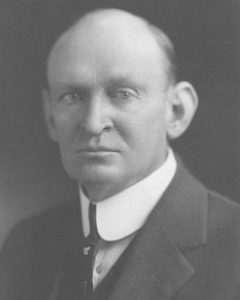Editor’s Note: Archibald T. Robertson was a scholar and an expositor. As the author of more than 40 books and a professor at Southern Theological Seminary in Louisville, KY, he influenced hundreds of thousands in their Christian life and service. This particular sermon was first preached during World War I, between 1917-1919.
“For I could wish that I myself were anathema from Christ for my brethren s sake, my kinsmen according to the flesh; who are Israelites; whose is the adoption, and the glory, and the covenants, and the giving of the law, and the service of God, and the promises; whose are the fathers, and of whom is Christ as concerning the flesh, who is over all, God blessed forever”
—Rom. 9:3-5
 Patriotism and piety are apparently placed in opposition in some countries by the issues of the present world-war. One of the first fulminations was the declaration of a large group of the foremost scholars and theologians of Germany justifying the conduct of the Fatherland in Belgium and in France. British scholars and theologians were quick to reply in a spirit of holy horror at the apparent blindness of the German group to the moral and spiritual issues of the war. The republic of letters was torn asunder, and the kingdom of God seemed rent in twain. Protestants have risen against Protestants, Roman Catholics against Roman Catholics, Greek Catholics against Greek Catholics, Mohammedans against Mohammedans, Jews against Jews. Kings have dragged their peoples into war. Neutral nations have been driven into the war in self-defense. In each case citizenship rises above religion, or at any rate the Christian citizen is compelled to be loyal to the position of his own country or be guilty of treason. The issue raised is one of tremendous import, and is intensely vital now in the United States, as our own country has entered upon war with Germany. We have millions of men of German birth or descent who must decide what they are to do. There is but one thing to do: to be loyal to the land of adoption. So real Americans all feel. So the great mass of the German-Americans feel, and will act. They are now Americans, not German-Americans.
Patriotism and piety are apparently placed in opposition in some countries by the issues of the present world-war. One of the first fulminations was the declaration of a large group of the foremost scholars and theologians of Germany justifying the conduct of the Fatherland in Belgium and in France. British scholars and theologians were quick to reply in a spirit of holy horror at the apparent blindness of the German group to the moral and spiritual issues of the war. The republic of letters was torn asunder, and the kingdom of God seemed rent in twain. Protestants have risen against Protestants, Roman Catholics against Roman Catholics, Greek Catholics against Greek Catholics, Mohammedans against Mohammedans, Jews against Jews. Kings have dragged their peoples into war. Neutral nations have been driven into the war in self-defense. In each case citizenship rises above religion, or at any rate the Christian citizen is compelled to be loyal to the position of his own country or be guilty of treason. The issue raised is one of tremendous import, and is intensely vital now in the United States, as our own country has entered upon war with Germany. We have millions of men of German birth or descent who must decide what they are to do. There is but one thing to do: to be loyal to the land of adoption. So real Americans all feel. So the great mass of the German-Americans feel, and will act. They are now Americans, not German-Americans.
The case of Paul is worth our study in the present situation. He was caught in the maelstrom of world politics; for Rome, like the United States, was the melting-pot of the nations, though not in quite the same sense. Racial and national characteristics persisted with considerable tenacity in the various provinces of the Roman Empire, which in Asia Minor paid little attention to the old boundaries. The old names for the peoples held on, so that Galatia, for instance, meant either the great Roman province or the old Celtic people in North Galatia. Paul was at once a Jew, a Tarsian, a Greek, a Roman, and soon a Christian. He was true to the best things in these elements, however contradictory they seemed at times. The terms and the concepts designated by them overlapped in various ways, and were not mutually exclusive.
Paul appears first as a brilliant young Jewish rabbi, a graduate of the school of Gamaliel in Jerusalem, pleased at the stoning of Stephen by the Sanhedrin, and soon the leader in the first general persecution of the Christians by the Jews. Racial and religious motives are undoubtedly mixed in him, as he presses the persecution with zeal and success, dragging men and women from their homes to prison and to death with shameless ruthlessness, for no other crime than that of believing in Jesus as the Jewish Messiah. Paul very breath came to be threat and slaughter, his taste for blood, as always, growing by what it fed on. His conversion stopped his career as a persecutor; but he was always a Jew, was proud of his people and his tribe, gloried in their wonderful history, and cherished their noblest hopes and aspirations (cf. Acts 22:3 ; 26:3-7; 2 Cor. 11:22; Gal. i :i3f. ; Rom. 9:1-5 ; Phil. 3:4-6). To be sure, relatively in comparison with Christ all this pride of race seemed mere refuse (Phil. 3:7ff.). With Paul, Christ is supreme, and rules even in the sphere of race and politics. Paul had been “exceedingly zealous for the traditions of my fathers” (Gal. 1:14), and never ceased to love the Jews, even when they persecuted him bitterly. As a Pharisee he shared their political conception of the Messianic kingdom as a great Jewish empire which was to drive Rome out of Palestine and dominate the earth, a Pan-Jewish propaganda. Paul remained a Pharisee in many things, particularly in the belief in the bodily resurrection (Acts 23:6), though, as a Christian, he perceived the spiritual nature of the kingdom of God in Christ. This he conceived to be the true Israel, the spiritual Israel, the children of faith, both Jews and Gentiles, gathered from every land on earth (Rom. 3:6, 28; 9:6ff.). Paul held that he was interpreting the true Judaism to the Jews in the cosmopolitan view of the promise to Abraham and the destiny of his people. He rises to the very height of patriotism in these words: “For I could wish that I myself were anathema from Christ for my brethren s sake, my kinsmen according to the flesh; who are Israelites; whose is the adoption, and the glory, and the covenants, and the giving of the law, and the service of God, and the promises; whose are the fathers, and of whom is Christ as concerning the flesh, who is over all, God blessed forever” (Rom. 9:3-5).
It is not easy to define patriotism, for it is more than mere love of the land of one s birth or of his citizenship. It is that, but it broadens out into the love of one s people wherever found, as Japanese love Japanese; Chinese, Chinese; Germans, Germans; Jews, Jews. The Jews had at this time lost their independence, though many of them still lived in Palestine under Roman rule. But many millions more dwelt in the Diaspora. Some of these fell much under the spell of the Greco-Roman civilization, and gave up many of their Jewish customs and views. But Paul was not Hellenized, though a Hellenistic Jew with Aramaean traditions. We see in Paul the struggle of the cultured Jew, loyal to his faith and people, to adapt himself to the world conditions in which he found himself, and to be a loyal Roman citizen.
But Paul was “born in Tarsus of Cilicia,” “a citizen of no mean city” (Acts 21 139; 22:3). He had a modern man s pride in the city of his birth and residence. In his “Cities of St. Paul,” Ramsay gives ample reasons that justify Paul s praise of Tarsus: It was one of the great cities of the Roman world, a Greek city where the Orient met the West, the seat of a great university, the home of philosophy, the meeting place of many cults, a town where Jews had a strong foothold. He was glad to be known as Saul of Tarsus, a Jewish citizen of this great city. Paul never forgot that he was a Jew, though always the educated Jew, trained to life as a Roman citizen in the most aristocratic position among the population of the great Hellenized, yet more than half Asiatic, city of Tarsus.
Paul “was brought up to a certain stage at Tarsus in the fashion needed for a Jewish boy who was born in the local aristocracy as a Roman citizen and a burgess of Tarsus.” He may have attended the University of Tarsus, and, after entering Gamaliel s school in Jerusalem, he probably spent his holidays at home like a modern college-student. Tarsus undoubtedly left its impress on Paul, and made him more than a narrow Palestinian Jew. Probably most men to-day love the towns where they live, whatever their race may be. This is the least of the problems of patriotism.
But Paul was a Hellenist, though not a Hellene or a Hellenizer. Being a Jew, he could not be a Greek by birth. Being a loyal Jew, a Hebrew of the Hebrews, he would not be a Greek in religion and custom. And yet nothing is more certain than that Hellenism made its appeal to Paul s intellectual nature. He spoke and wrote the Koine, the current Greek, with power, as well as the Aramaic (called “Hebrew” in Acts 22:2). He shows points of contact with Greek thought in various ways. He was able to speak with the Stoics and the Epicureans in Athens, and used many of the Stoic terms in his Epistles, and quoted from three of the Greek writers. “Previous comparisons have not sufficiently appreciated that which may be stated in one word as Paul s Hellenism.” Indeed, one of the modern interpretations of Paul s theology is that he derived much of it from the Greek Mystery-Religions. That is not true, but Paul certainly knew the dialect of the initiates in those mystic cults, and knew how to answer them, and to turn their terms to the service of Christ.
Beyond a doubt, Paul is a citizen of the world, a true cosmopolite, and not a narrow Palestinian Jew or a mere provincial Cilician. His patriotism must be interpreted in terms of world-sympathy, not of world-power. He does not wish the Jews to conquer Rome as they tried to do in 66-70 A.D. and failed.
But Paul is a Roman citizen with full privileges and prerogatives. Roman citizenship was a prize that was not open to all. There were more non-citizens than citizens in the Roman Empire; probably more slaves than citizens. Claudius Lysias bought it “with a great sum” (Acts 22 128); but Paul proudly said: “But I am a Roman born.” The man who could say Sum Romanus felt an instinctive superiority over others who did not possess this advantage.
We know that Paul appealed to his rights as a Roman citizen in other emergencies, as in Philippi (Acts 16:37) and in Csesarea (25:1 if.). What was Paul s attitude toward the Roman government after Roman magistrates and officers, finally including the Emperor himself, became hostile to him? It is as a Roman citizen that we touch the side of Paul s life that is more nearly parallel to our modern idea of patriotism in an American, British, or German citizen. Roman officers were not all unkind to Paul. Gallic practically gave a decision in Paul s favor, and recognized Christianity as a form of Judaism and so a religio licita (Acts 18:14-16). The Asiarchs of Ephesus were friendly to Paul (19:31). Sergius Paulus, Proconsul of Cyprus, was a convert under Paul s preaching (13:12). Julius the Centurion treated Paul kindly (27:3). Even Nero, during Paul s first Roman imprisonment, probably finally dismissed the case for lack of evidence without a formal trial. Certainly the Prefect Burrhus or the Stratopedarch to whom Paul was delivered in Rome gave him a great deal of liberty (28 :3of.). But Paul was mistreated by the city officials in Antioch in Pisidia (Act 13:50), in Iconium (14:5), in Philippi (16:22), in Thessalonica (17:6-9), where Paul and his followers were accused of acting contrary to the decrees of Caesar, as in Philippi he was charged with introducing Jewish customs which Romans were not allowed to receive. The duplicity of Felix and Festus was hard to bear (Acts 24-26). Thus early in Paul s ministry he saw the shadow of the Man of Sin who set himself up as God to be worshiped (2 Thess. 2 :3f.).
The Emperor-cult was the chief religion of the Roman Empire, and Paul was bound as a preacher of the gospel to meet it in an acute form. But the point to note just here is that Paul did not allow the injustice done him and Christianity as represented by him to pervert his views of government as an ordinance of God, or to make an anarchist out of him. Paul was a rebel against all wrong. He hesitated not to show the injustice of rulers when it was necessary (Acts 16:37; 25 :iof.). No abler champion of human liberty has ever lived than Paul. “For freedom did Christ set us free” (Gal. 5:1). “For ye, brethren, were called for freedom” (5:13). These words are as pertinent for political freedom in Russia and Germany as for religious liberty. It is sometimes said that Paul s words in Roman 13:1-7 were written during the Golden Quinquennium of Nero.
That is true, but Paul s words here are quite independent of the personal character of Nero. “The powers that be are ordained of God.” They derive their power from God, but not by “divine right of kings.” Vox populi vox del in this case. The people have the right to rule from God. “Rulers are not a terror to the good work, but to the evil.” This is the ideal, and is not a picture of Romanoffs, Hapsburgs, Hohenzollerns, or police grafters in New York or Chicago. “He is a minister of God to thee for good.” “They are ministers of God s service, attending continually upon this very thing.” Here Paul sketches in broad outline the functions of civic rulers, whether mayors, governors, presidents, or kings. If they had always lived up to this ideal, there would certainly have been fewer wars between nations and rebellions against rulers. Nations, as a rule, do not rush into wars of conquest. They are led on or driven on by rapacious rulers who misuse their power for personal aggrandizement or wild schemes of empire. Paul is a staunch supporter of law and order, including taxes. To be sure, he is no blind standpatter or reactionary. He is not, like Seneca, the apologist of Nero. He was the first champion of the emancipation of slaves, and urged Philemon to set free and treat as a brother in Christ Onesimus, his converted runaway slave whom Paul returned to him (Philemon 14-21). He urged the Christian slaves to bear their lot with Christian fortitude, but announced a doctrine which was the death knell of human slavery: “There can be neither Jew nor Greek, there can be neither bond nor free, there can be no male and female; for ye are all one man in Christ Jesus” (Gal. 3:28). Paul preached the brotherhood of man to a world of slaves. He, more than Tom Paine and Voltaire, proclaimed the rights of man and the world as his country.
But did not Paul become embittered toward Nero and the Roman government after Nero began his fierce persecution of the Christians? Unless we follow the Pastoral Epistles, we have little to guide us in answering this query. I think that they are genuine, and so have no hesitation in appealing to them for witness. After Nero had charged Christians with burning Rome, and was burning them and feeding them to the lions and tigers, Paul wrote: “I exhort therefore, first of all, that supplications, prayers, in tercessions, thanksgivings, be made for all men; for kings and all men that are in high place; that we may lead a tranquil and quiet life in all godliness and gravity” (i Tim. 2:if.). Here the purpose of government is clearly presented. Paul is still a loyal Roman citizen, in spite of Nero. At the end, when the first stage of the last trial made it plain what the outcome would be, Paul has no bitter word for Nero, unless he called him “the lion” (2 Tim. 4:17), as is not likely. He probably refers to Nero s failure to give him to the lions, which he had escaped as a Roman citizen. Would Paul have responded to the call of Rome to fight? That would depend on the issue. He would have opposed a war of conquest and pillage. Most of the soldiers were mercenaries anyhow. They were hired to fight, and did not always express national convictions or the will of the people. In a war of defense, Paul would have been ready to “do his bit,” I believe. He spoke kindly of soldiers, and used them as illustrations of service for Christ. “Suffer hardship with me as a good soldier of Christ Jesus. No soldier on service entangleth himself in the affairs of this life; that he may please him who enrolled him as a soldier” (2 Tim. 2:3f.).
And Paul was most of all a Christian. We may be sure that with Paul Christ was Lord and Master. He would not subordinate service to Christ to Caesar, let alone to Greek philosophy, to Tarsus, or to Judaism. Paul saw the issue coming between Christ and Caesar. The papyri and inscriptions give abundant evidence of the use of the phrase “Lord Caesar.” We know that the offer of life was made to Polycarp if he would only say, “Lord Caesar” ; but he steadily refused, and said, “Lord Jesus.” So he went to death rather than recant. We know how Paul felt about it. “No one can say, Jesus is Lord, but in the Holy Spirit” (I Cor. 12:3). This was the spirit of the martyrs who were slain for the word of God (Rev. 6:9) at the hand of Roman emperors. Paul met that fate at the hand of Nero rather than renounce the Lord Jesus.
Ten thousand Chinese Christians laid down their lives at the feet of Jesus rather than renounce him at the demand of the Boxer leaders and the Empress Dowager. So then, with Paul patriotism is not the highest virtue, though it is very high. Loyalty to one s land is secondary to loyalty to one s God. To be sure, it is high treason or rebellion to refuse to obey the command of one s government. One who takes that position must be willing to pay the price. That price is one s life. But the price is not too high when the alternative is to disobey the clear will of God. “But Peter and John answered and said unto them, Whether it is right in the sight of God to hearken unto you rather than unto God, judge ye: for we cannot but speak the things which we saw and heard” (Acts 4:i9f.). No Christian should have blind patriotism. Christ is above Cnesar. This does not mean that the Church is above the State. Christ is more than the State, more than the Church. One of the blessings of free government, of the people, by the people, for the people, is precisely this : that the alternative between Christ and the State is avoided. Certainly, if there is a solid body of Christian citizens in a free commonwealth, it will be avoided. The men who are citizens of heaven, a colony of heaven on earth (Phil. 3 :2o) , will not so far forget themselves as to rush into war contrary to the clear spirit of Christ. Christian citizens, if allowed to rule, wish peace if it is possible to have it and be true to other high obligations (Rom. 12:18). But Paul was not a peace-at-any-price man. His teaching justifies the “League to Enforce Peace.” His gospel is the gospel of courage that calls upon all soldiers of Christ to put on the panoply of God, and to withstand in the evil day against the world-rulers of this darkness (Eph. 6:10-16).










[…] Source link […]
1
4.5